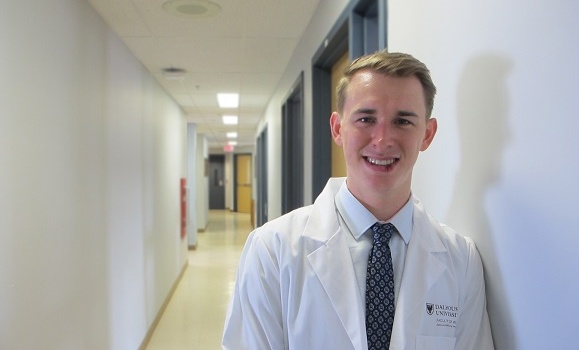» Go to news main
For the love of research: Dal med student leading author on paper published in renowned society journal

Brandon Rosvall is the primary author of Impact of Obesity on Intensive Care Unit Resource Utilization After Cardiac Operations published recently by The Society of Thoracic Surgeons. This is Brandon’s first major research project and has ignited a love of research and left him excited for future research projects.
Interest in obesity and surgery
Since 2013, new Dalhousie medical students are required to choose and complete a research study. The Research in Medicine (RIM) program incorporates research into the medical curriculum and is the first of its kind in Canada.
For his RIM project, Brandon chose to focus on an area that was of interest to him. He married his interests of surgery and obesity when he met with his RIM mentor, Dr. Ansar Hassan, a cardiac surgeon at the Saint John Regional Hospital. Together they devised a research project looking at obesity rates and Intensive Care Unit (ICU) resources post-surgery.
The study examined over 5,000 cardiac patients at the Saint John Regional Hospital from 2006 to 2013. Brandon’s study divided patients into groups based on their Body Mass Index (BMI) using a standard definition from the World Health Organization.
They found that obesity was correlated to an increase in ICU resource usage. “Our study results enable us to improve efficiency and quality of healthcare delivery to patients. For instance, knowing which patients require more time in the ICU allows for better prediction of ICU bed availability and more efficient scheduling of staff and surgeries.” This has a potential for cost savings and improved patient care through resource allocation.
Brandon explains, “after cardiac surgery, patients with greater obesity were three times more likely to need additional time on mechanical ventilation, four times more likely to require additional time in the ICU, and three times more likely to be readmitted to the ICU. Further research is needed to determine why this relationship exists although it could be a result of factors like greater risk of infection, less functional reserve, and longer healing times.”
When asked whether they found what he expected, he notes “there actually existed significant debate and confusion over the issue in the scientific community with many believing that obese surgery patients would require less resources. We wanted to clarify this issue and so looked at our own data for the answers. It made sense to us that recovery would be more resource intensive in patients with a greater BMI, and so we were not overly surprised that our data reflected this.”
Years of study
Brandon is now getting ready to enter his final year of his undergraduate medical degree Looking back, he recalls how he completed his first elective in cardiac surgery allowing him to gain “hands on” experience in the area of his research project. This experience and the experience from other electives has led him to develop an interest in otolaryngology, the surgical specialty focusing on the ears, nose and throat (ENT). While this has been his first major research paper, it is not his first publication.
“We presented our preliminary findings at the Canadian Cardiovascular Conference in Toronto when I was in my second year. Between second and third year, we conducted a more thorough literature review and robust statistical analyses in preparation for publication.” In the meantime, Brandon has published an ENT paper with Dr. Chin, “Is Uvulopalatopharyngoplasty Effective in Obstructive Sleep Apnea?”, and is currently working on another project with an ENT specialist, Dr. Hoyt.
No regrets
Brandon graduated with an undergraduate degree in Biology/Psychology at the University of New Brunswick (UNB) prior to entering DMNB. Although he studied science, he had never undertaken a research project or published a research paper of this magnitude.
His excitement to begin his RIM project continues today. He talks about the extensive literature review and examination of the data used. Brandon credits the members at Cardiovascular Research New Brunswick for helping him process the data and statistics for this project. His first two years were spent working tirelessly on this project.
Thanks to the support he received, he was still able to move his personal life forward. “Having such a supportive and experienced team was very helpful. I was still able to enjoy my summers. I married the love of my life last summer and honeymooned in Europe.”
Advice for new students
As Brandon prepares for his final year of electives that will take him across Canada, he hopes to be matched to a program where he can continue research as a resident. In the meantime, he offers some advice for the new class on their RIM projects. “Find a research project you’re interested in and a mentor who shares your passion. It also helps to work with someone who has research experience and a supportive team - having people that can teach and guide you makes the sharp learning curve a bit easier.”
With a gleam in his eye, he finishes the interview by stating, “Once you learn the scientific method, you can ask your own questions, find your own answers, and share them with the world.”
Recent News
- Leading the way: Dal’s 2024 university wide teaching award winners exemplify excellence in higher ed
- Faculty of Medicine presents awards at annual faculty meeting
- Dalhousie Stands Out Amid National Downward Matching Trend
- Dr. Sara Folkins receives C. B. Stewart Medal recognizing academic excellence
- Channelling the power of Natural Killer cells to beat cancer
- Rare disease specialist returns to Dalhousie
- Ophthalmologist, author receives Gold‑Headed Cane Award
- Celebrating the Class of 2024
